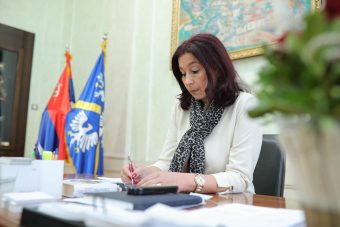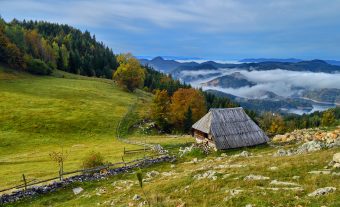
For many years, Užice was on the list of cities with the highest air pollution. During the heating season, it often happened that the amount of soot in the air exceeded the allowed limits several times. The city’s specific position, which did not allow the wind to disperse the dangerous particles of pollution, only aggravated the situation. When numerous individual coal and wood fireboxes are added to that, as well as exhaust gases from cars, it is clear that the fight of the citizens of Užice for the right to cleaner air was not easy.
When we say the citizens of Užice, we mean both the citizens and the local self-government, and the city authorities are already working hard to solve the problem of polluted air, which greatly affects the quality of life of people and the environment. Gasification of the city, afforestation, investments in energy efficiency, and the inclusion of boiler rooms in the district heating system, purposeful spending of funds intended for environmental protection, are just some of the authorities’ measures taken by the so that citizens in this city can breathe clean air. We asked Jelena Raković-Radivojević, the mayor of Užice, how they affected the air quality and what they plan to do in the future.
EP: Užice is working intensively on solving the problem of air pollution. What would you highlight as the most important results?
Jelena Raković-Radivojević: We are one of the small number of local governments that in the previous period took a large number of measures and activities aimed at reducing air pollution, in accordance with the Air Quality Plan that we have adopted. The first measure that gave the most results was the gasification of the city, starting with the construction of the main gas pipeline Preljina-Užice, construction of asteel gas pipeline and metering and regulation stations, to the formation of a public-private partnership between the City of Užice and MPP “Jedinstvo” and gas distribution “Užice gas”. In the last ten years, the boiler rooms have been connected to the district heating system “City heating plant Užice”. 11 out of 12 city boiler rooms were converted, representing 75 percent of the total installed capacity. Due to technical reasons, it is not possible to connect the last boiler room, which is on fuel oil, to the district heating system, so the construction of a new gas boiler room is planned, which will enable the connection of new users to the heating network.
In focus:
In cooperation with the Ministry of Environmental Protection, we implemented the project “Let’s breathe life into nature” within which 14 hectares were afforested in the city area. An effective measure with a direct impact on reducing air pollution is the separate ash from burning in individual households. By installing special containers for collecting ashes, we reduced the burning of containers by 70 percent.

At the City’s initiative, the monitoring of ambient air at the Automatic Measuring Station has been improved, where, in addition to other parameters, we can now monitor the values of suspended PM10 and PM2.5 particles in real-time. Ambient air monitoring has also been improved within the local monitoring network by setting up another measuring point in the city center for monitoring the concentrations of PM10 particles, where pollution from the combustion chamber is primarily registered. In this way we monitor the effects of the measures taken to reduce pollution. The competent inspections regularly control the boiler rooms of economic entities and other legal entities and entrepreneurs. Where the emission limit values for the measured parameters are determined to be exceeded, it is necessary to eliminate the deficiencies, i.e. to reduce the emission. Fuel oil, pellet and gas combustion plants did not show exceeding the emission limit values for the tested substances.
The City of Užice is also one of the few local governments in which there is no unintended spending of funds intended for environmental protection. Funds earned from the collection of local fees for environmental protection and improvement were increased by additional funds from the City budget and spent exclusively in accordance with the Program for the use of funds from the budget fund for environmental protection approved by the Ministry of Environmental Protection. The fact that every year, despite the unfavorable weather conditions caused by climate change, the number of days with exceeding the limit values, as well as the number of days with very high values of pollutants, speaks in the right direction
EP: How much is invested in energy efficiency, and to what extent do citizens apply for these funds?
Jelena Raković-Radivojević: Since 2015, the local self-government has been implementing a unique project to improve energy efficiency in individual buildings as direct assistance to our fellow citizens in solving air pollution. This project co-finances the installation of joinery, thermal insulation and the purchase of gas and pellet boilers. The project’s goal of the project is to reduce harmful emissions through energy savings, which will be achieved through better insulation of buildings and the use of environmentally friendly fuels. From the beginning of this unique project until 2020, more than 90 million dinars have been allocated from the budget for its realization. Last year alone, 40 million dinars were set aside for co financing energy efficiency measures. So far, over 1,000 of our fellow citizens have used the funds we allocate. Many citizens always apply to local competitions, which indicates their great interest in solving this problem. Most people were interested in purchasing gas boilers. According to the plans, 45 million dinars should be set aside for this year to subsidize energy efficiency measures. So we hope that only this year we will largely solve the problem of air pollution from individual furnaces.
Interview by: Milica Radičević
Read the whole interview in the new issue of the Energy portal Magazine CIRCULAR ECONOMY, march 2021 – may 2021.



